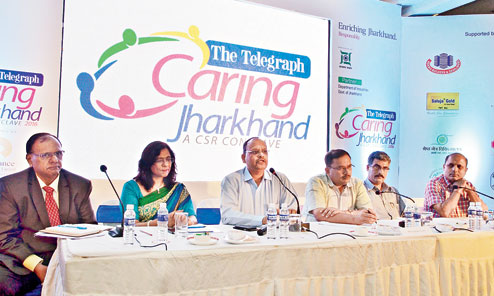Synergy of purpose was the motto at Caring Jharkhand, a conclave organised by The Telegraph in partnership with the state government

Theme: CSR IN HEALTH: ADOPTING HOSPITALS OR SERVICES?
In the chair: Dr B.L. Sherwal, director, Rajendra Institute of Medical Sciences
Speakers:
- Dr Sanjay Kumar, medical director of Bhagwan Mahavir Medica Superspecialty Hospital, Ranchi
- Amitav Chatterjee, cluster head of Meditrina Hospital, Jamshedpur
- Dr Rajesh Kumar, director of Rani Hospital, Ranchi
- Preeti Sehgal, company secretary and chief of communications (CSR) of Jusco, Jamshedpur
- S. Nagasubramanian, head, corporate communications and CSR of RSB Transmission, Jamshedpur
House opinion: CSR in the health sector is not necessarily about organising health camps or distributing medicines to the needy. It can actually bridge the gap between demand and supply through government facilities. In Jharkhand, there are ample opportunities for the private sector to step in. Among them are prevention of hypothermia (among newborns), trauma relief and addressing the needs of various tribal communities. More areas can be targeted after conducting proper assessment of need and working out sustainable projects. Like the CSR council, the state government needs to set up a consortium of various stake-holders in the health sector to identify key problems so that a strategic approach can be initiated to resolve them
Best idea: “Let there be more tripartite 'private-private-public’ partnerships in the health sector, like people-friendly initiatives like Armour ambulance service. This is the best example of how a big corporate can support a smaller one in executing an initiative monitored by the government to reach out to people meeting accidents on road. It is a successful model that can work wonders,” says Dr Sanjay Kumar of Medica, Ranchi

Theme: GOVERNMENT & CSR: THE GOVERNMENT’S TAKE ON CORPORATE PARTICIPATION ON VARIOUS VERTICALS/DEPARTMENTS LIKE SPORTS, EDUCATION & ENVIRONMENT
In the chair: Satendra Singh, secretary, sports, art-culture and youth affairs
Speakers:
- Abhijit Ghosh, CMD, Heavy Engineering Corporation (HEC)
- Dr Vijay Kumar Mishra, head of critical care at Medica Hospital, Ranchi
- Anindya Sinha, regional director of CMPDI
- Dr Rohit Lal, director of Lal’s Hospital and Research Centre
House opinion: Jharkhand is the first state in the country to form a CSR council that aims to channel CSR activities in a sustainable manner so that the required benefits reach the needy people. Also, Jharkhand State Sports Promotion Society (JSSPS), formed to set up the country's first sports university, is also a path breaker in the area of CSR as Central Coalfields (CCL) has agreed to run the facility. The corporate sector is usually very good at analysing the need of a particular locality. HEC, for instance, has been training tribal boys and girls in skill development and nursing to make them employable. This also ties in with the overall vision of the Centre. CSR should be used to usher in change at the grassroots, but ultimately, CSR can only act as a catalyst but cannot bring in change unless the government comes forward.
Best idea: “The government should make the infrastructure and hand over the same for providing useful service to the community,” says Satendra Singh, the state secretary of sports, art-culture and youth affairs

Theme: SMALL CHANGES THAT CAN GO A LONG WAY IN MAKING A TRANSFORMATION
In the chair: A.K. Singh, director, Life Education and Development Support
Speakers:
- Ganesh Reddy, secretary of Citizens Foundation, Ranchi
- Rajkumar Gope, policy advocacy manager of Ekjut, Chakradharpur
- Anup Hore, state manager of Plan India, Jharkhand
- Savita Sengar, VC of Rai University, Jharkhand
- SP Agarwal, pro chancellor of Sai Nath University, Ranchi
- Fazlul Haque Krishnan, project coordinator of Save the Children, Jharkhand
House opinion: Making a positive contribution to society is the essence of CSR. Non-profits of the state have already set their sights on the right approach. Some of their moves have been extremely effective, not exactly trying to "pull out the sinking Titanic" but more like changing the course of a large ship to save many lives. For instance, 'participatory learning and action (PLA)' cycle of Ekjut, through which infant mortality was brought down, 'For You' of Citizen’s Foundation that distributes donated articles of daily use to the needy and Dream Scholarship of Rai University for vocational training of girls are worthy examples to follow. Similarly, the CSR contribution of Reliance Communications helped LEADS to prop up 600 senior adolescents who are now working in various establishments. But, the need to protect children and prevent atrocities against them is an issue of paramount importance that needs to be taken up through CSR.
Best idea: “Child protection is an important issue that is yet to come under CSR. Once funds are rolled out to protect children, many other issues would start to get resolved on their own,” believes Anup Hore of Plan India, Jharkhand
Compiled by Chhandosree & Achintya Ganguly; pictures by Prashant Mitra











